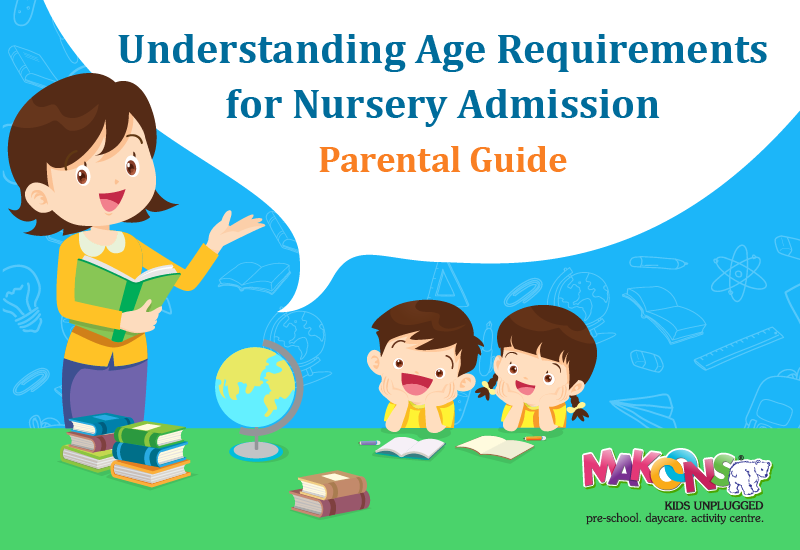One of the first and most important decisions you will have to make as a parent is deciding when to begin their road of education. Whether you are ready to register your child ahead of time or shortly later, you must know the nursery entry age.. Though each school has its unique policies, parents may keep aware and ready by following some broad recommendations.
From minimal age criteria to how they fit Indian best preschool and early education goals, this thorough school admission age guide lays down all you need to know. Let’s examine the age for preschool more closely and discuss methods to make sure your child starts at the proper age.
Why Nursery Admission Age Matters?
The early school age criteria transcend simple numerical values. They are designed to match a child’s emotional, social, cognitive, and physical development. Starting too early could overwhelm a child who is not developmental mature; deferring education could cause lost early learning chances.
For a youngster, nursery school lays the foundation of formal education. Knowing the correct nursery entrance age helps to ensure a smooth and good start of your child’s academic career.
When Should One Apply for School or Nursery Admission?
Usually in India, the ideal age for preschool admission falls between three and four years.. Although state and institution-specific variations abound, most schools adhere to this fundamental rule:
Class Level Recommended Age
- Playgroups between 1.5 and 2.5 years
- Kindergarten Three or four years
- LKG (Lower KG) 4 to 5 years
- UKG, Upper KG, Five to six years.
As of March 31st, the academic year most schools demand the kid to be at least three years old for nursery admission. For instance, your child qualifies for nursery entrance in the 2026–2027 academic year if they turn three by March 31, 2026.
Tip: As the exact cut-off date for age eligibility may vary somewhat depending on the particular school you are applying to.
Government Guidelines on Early Education Age Criteria
Preschool should be formally included into the National Education Policy (NEP) 2020 under a new framework that advises:
- Ages three to eight: consists two years of Grade 1 and 2 and three years of preschool (Nursery, LKG, UKG).
- Encouragement of age-appropriate admittance guarantees emotional and cognitive maturity.
- This method guarantees that children are neither pushed too early nor held back needlessly, therefore supporting a more balanced and developmental friendly schedule..
Why Age for Preschool Matters Beyond Eligibility?
Developmental Compatibility
Though each kid develops differently, important benchmarks including language development, social interaction, and emotional control often show up between three and four years of age. These natural stages are considered in design for the school admission age recommendation.
Smooth Social Integration
Children who start nursery at the appropriate age frequently fit better in the regimented surroundings, make friends more quickly, and obey classroom rules more precisely.
Steer Clear of Grade Skip later Repetitious Behavior
Starting at the appropriate age helps to prevent future mismatches in grade placement, therefore influencing your child’s academic path and confidence and perhaps causing skipping or repeating of a class.
Exceptions and Flexibility in Admission Age
Age requirements give some leeway, particularly in private or overseas schools. Still, there are both upper and lower limits:
- Early admission is something some parents think of as “getting ahead” for their children. Experts warn against hurriedly speeding this procedure, though.
- Should a child fall outside the age cut-off, parents can look at bridging programs or discuss waiting a year instead of imposing early entrance.
- Always give your child’s readiness top priority, above outside pressure or comparison.
How to Prepare Your Child for Nursery Admission?
Whether your child is getting close to preschool or you are just beginning to make plans, these ideas will help to guarantee a seamless transition:
1. Create Independence
- Help your youngster to independently handle simple chores including feeding, hand washing, and bathroom use.
- Helping develop social skills
- Plan little group events or playdates to assist your child grow at ease with social situations.
2. Create Habits
- To fit school schedules, get your youngster used to a set routine comprising wake-up, meals, and sleep.
3. Improve your communication skills.
- Through everyday talks, music, and stories, they increase their vocabulary and listening ability.
What to Ask Schools Before Enrolling?
While shortlisting universities, think about asking the following:
- The cut-off birthday for childcare entrance is what?
- Exists a pre-nursery or playgroup alternative offered by them?
The Student-Teacher Ratio:
- For early childhood learning, what course of instruction or curriculum do they use?
- How may they encourage emotional and social development?
- These questions will help you to fit the expectations and environment of the institution with the needs of your child.
Also Read – How to Choose the Right Pre-K Program: A Checklist for Parents?
Notes of Final Thought
Giving your child a confident and happy start to learn depends first on knowing the right nursery entry age. Although age is only one element, it is a major one influencing your child’s academic prospects, peer compatibility, and school experience.
Referring to this school admission age guide can help you make a wise choice depending on school policies and developmental level of your child. Remember, every child is different; so, choose a start time that advances their development instead of merely a calendar date.
What age is recommended for playgroup?
Playgroup is usually for children between 1.5 and 2.5 years old, helping them get used to group activities and basic routines.
What ages are typical for LKG and UKG?
LKG is usually for children 4–5 years old, while UKG is for 5–6 years old, preparing them step by step for primary school.
Why does age matter for nursery admission?
Age ensures that children are emotionally, socially, and mentally ready to handle the structured learning environment of a nursery.
Can admission age vary between schools?
Yes, the cut-off dates and age rules can differ depending on the school’s policy or the state regulations, so it’s important to check with the school.


